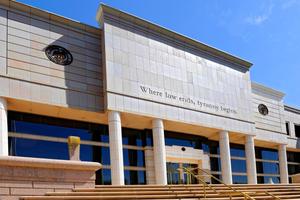Texas Legislators Consider Pro-Life Bills
Legislation targets ‘wrongful birth’ lawsuits and Planned Parenthood.

AUSTIN, Texas — Among the targets of Texas pro-life advocates are so-called “wrongful birth” lawsuits and Planned Parenthood’s alleged involvement in the sale of unborn baby parts. Both are finding some success in the state senate.
In some cases, parents of a child born with a disability such as Down syndrome have filed lawsuits against doctors, claiming that they were not informed of a disability in time to procure an abortion. Such claims aim to secure the costs of raising the child, even lifetime costs.
Senate Bill 25 would prevent parents of children born with disabilities from suing their physicians.
The bill, which has the support of the Texas Catholic Conference, passed the state senate by a vote of 21-9 March 21. It now heads to the Texas House of Representatives for consideration.
“We are thrilled that the Senate has passed S.B. 25, because it reverses a decades-old injustice and bad public policy that devalues babies, both unborn and born, who have a disability,” Joe Pojman, executive director of the Texas Alliance for Life, told CNA March 23. “In our view, S.B. 25 eliminates wrongful-birth lawsuits, while holding doctors accountable to practicing good medicine.”
While opponents of the bill charged it would allow doctors to withhold information from parents about an unborn child, Pojman said the bill’s text explicitly excludes such a possibility.
He added that the bill is consistent with Texas’ policy of promoting childbirth over abortion.
Meanwhile, Texas Alliance for Life’s top priority is the passage of S.B. 8, provisions of which would, in Pojman’s words, “shut down Planned Parenthood’s harvesting and sale of body parts harvested from the bodies of aborted babies.”
The bill passed the state senate March 15 by a bipartisan vote of 24-6. The state house considered its own version March 22.
Texas Gov. Greg Abbott called for such a bill in his January “State of the State Address.”
The bill follows an undercover investigation from the Center for American Progress, which found Planned Parenthood staffers and leaders appearing to encourage the illegal sale of fetal tissue and unborn baby body parts for profit.
A Dec. 7, 2016, letter from the Select Investigative Panel of the U.S. House Committee on Energy and Commerce referred an unnamed Houston abortionist to the Texas Attorney General’s Office for alleged violations of a federal partial-birth abortion ban.
S.B. 8 would also bar partial-birth abortion, creating a criminal penalty for the physician and a cause for civil action for the father.
The bill has the support of the Texas Catholic Conference.
Another bill, S.B. 415, passed the state senate by a 21-9 vote.
The ban on “dismemberment abortions” would bar “dilation and evacuation” procedures, which use surgical instruments to grasp the unborn baby and remove his or her parts while he or she is still alive. The procedure is the most common second-trimester abortion procedure.
However, the Texas Alliance for Life opposed it.
“We look forward to the day when laws protect all unborn babies from abortion and the courts uphold those laws,” Pojman said. “Unfortunately, a ban on dismemberment abortion would never be enforced, and it would save no lives.”
He said the bill had zero chance to survive a federal court challenge and could create a precedent to make overturning Roe v. Wade more difficult.
“We believe it to be naive and harmful to pursue such legislation this session, given the makeup of the Supreme Court now and for the foreseeable future. Since these bills will set the pro-life movement back rather than moving us forward, we cannot support these bills.”
A loss in federal court would also fund the abortion movement, as the state is required to pay plaintiff attorney fees if the plaintiff wins on constitutional issues.
Pojman pointed to the Whole Woman’s Health v. Hellerstedt case, which successfully challenged parts of a Texas law requiring more safety regulations at abortion facilities.
The abortion providers are asking for $4.5 million in legal costs.
“We do not know what they will end up receiving,” Pojman said. “We do know, however, that whatever the attorneys for the abortion providers receive will be used to attack other pro-life laws in Texas and in other states.”
- Keywords:
- pro-life legislation
- texas

















